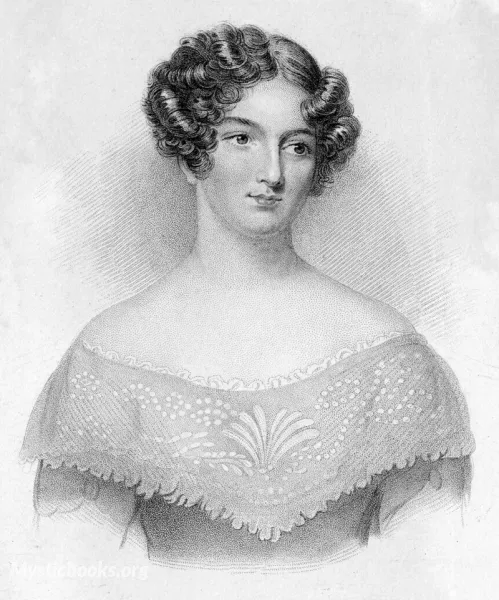
Timeline
Title
Country/Nationality
Catherine Grace Frances Gore
Born into a family of modest means in Nottinghamshire, England, Catherine Grace Frances Gore, née Moody, emerged as a prolific and influential figure in the literary landscape of the 19th century. Her works, characterized by their sharp social commentary, captivating narratives, and exploration of gender roles, captivated readers across the English-speaking world.
Early Life and Literary Beginnings
Born on February 12, 1798, Gore's early life was marked by a love for literature and a fascination with the world around her. She displayed a remarkable aptitude for writing, composing her first novel at the tender age of fifteen. Her father, a wine merchant, encouraged her literary pursuits, providing her with the necessary support and resources to develop her craft.
In 1823, Gore's debut novel, "The Hungarian Tales," was published, marking the beginning of a prolific literary career. Her novels, often set amidst the upper echelons of society, delved into the complexities of human relationships, social dynamics, and the challenges faced by women in a patriarchal society.
Social Commentary and Exploration of Gender Roles
Gore's works were not mere tales of romance and intrigue; they served as a platform for social commentary and a reflection of the changing roles of women in the 19th century. She addressed issues of female empowerment, financial independence, and the constraints imposed upon women by societal expectations.
Her novels, such as "Mothers and Daughters" (1831) and "Cecil" (1841), explored the struggles of women navigating the complexities of marriage, motherhood, and societal pressures. She portrayed female characters who were not just passive figures but active agents, seeking to assert their individuality and challenge the status quo.
Notable Works and Literary Influence
Gore's literary output was immense, with over seventy novels, numerous short stories, and several plays to her credit. Her novels were widely read and translated into multiple languages, making her a popular and influential figure in the literary world.
Apart from her novels, Gore also made significant contributions to the genre of drama. Her plays, such as "The School for Coquettes" (1831) and "Mother-in-Law" (1834), were staged in London and enjoyed critical acclaim. Her plays showcased her wit, social observation, and ability to capture the nuances of human interaction.
Philosophy and Legacy
Gore's philosophy centered on the belief in the power of literature to reflect and influence society. She saw her writing as a tool for social commentary, challenging the prevailing norms and advocating for greater equality and understanding. Her works explored the complexities of human nature, the challenges faced by women in a patriarchal society, and the importance of individual expression.
Gore's legacy as a novelist and dramatist is undeniable. Her works continue to be read and studied for their insights into 19th-century society, their portrayal of female characters, and their exploration of universal human themes. She is remembered as a pioneer of social commentary and a champion of female empowerment through her literary contributions.
Interesting Facts About Catherine Grace Frances Gore
- Gore was a close friend of several prominent literary figures, including Lady Blessington, Edward Bulwer-Lytton, and William Thackeray.
- She was a passionate advocate for women's education and believed in the importance of female literacy.
- Gore's novels were often serialized in popular magazines, reaching a wide readership across the English-speaking world.
- She died on January 29, 1861, leaving behind a rich literary legacy that continues to inspire and intrigue readers today.
Books by Catherine Grace Frances Gore

Mrs. Armytage, or Female Domination
In the heart of Victorian society, where social class and appearances reign supreme, Mrs. Armytage stands as a formidable matriarch, wielding her influence with an iron fist. Her husband's passing has left her the sole ruler of her household, and she...